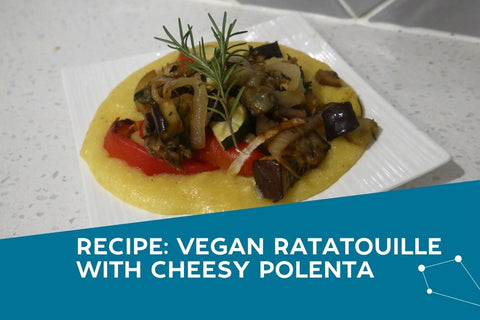(GF, DF)
Serves: 4-6
Ingredients:
⊕ 1 large eggplant
⊕ 1 red capsicum
⊕ 2 medium tomatoes
⊕ 2 medium zucchinis
⊕ 1 onion
⊕ 10 garlic cloves (peeled)
⊕ 2-3 tsp of thyme and rosemary (preferably fresh, can use both or individual)
⊕ Olive oil
⊕ Salt and pepper
⊕ Balsamic vinegar
⊕ 1 cup polenta
⊕ ½ cup grated cheese (parmesan, mozzarella, goats cheese or vegan alternative)
Garnishes: parsley, basil, capers, chilli flakes, olive oil
Method:
- Preheat your oven to 200 degrees. Line 2 x large baking trays with baking paper
- Cut eggplant into thick bite-sized pieces. Slice capscium into ½ inch wide strips. Cut tomatoes into ¾ inch wedges. Slice zucchini horizontally and then again into ½ inch thick half moons and slice onion into ¼ -½ inch thick half moons.
- Spread vegetables evenly onto the baking trays. Add whole garlic cloves and herbs. Drizzle with olive oil, salt and pepper and mix through. Roast in the oven for approximately 20 mins, turning the mixture, roast for another 20 minutes, turning mixture again. Reduce heat to 150 degrees and roast for another 10-20 minutes until vegetables are tender and caramelised.
- Cooking polenta: bring water to the boil in a medium pot. Slowly add poletna whilst whisking vigorously. Cover and cook for approximately 15 minutes, stirring in olive oil and cheese,salt and pepper until a thick and creamy paste forms.
- Divide amongst the bowls and place warm ratatouille over the top, garnishing with fresh basil or parsley.
What is polenta?
Polenta is an italian type of porridge dish made from cornmeal, water and salt (occasionally cheese and butter as well). It is a gluten free source of complex carbohydrates, meaning the digestion process is slower than simple carbohydrates like a piece of fruit, keeping you fuller for longer and providing longer-lasting energy. Polenta can be used as a side dish or a base for other foods.
The yellow of the cornmeal is rich in carotenoids and phenolic compounds, significant antioxidants whose properties are said to be linked to lowering the risk of eye diseases, heart diseases, diabetes, cancer and dementia as well as reducing inflammation through both the brain and body.
Siyan, Sheng, Tong, Li, Liu, (2018). Corn phytochemicals and their health benefits. Food Science and Human Wellness, 7(3),:185-195. Doi. https://doi.org/10.1016/j.fshw.2018.09.003
GutiErrez-Grijalva EP, Ambriz-Pere DL, Leyva-Lopez N, Castillo-Lopez RI, Heiedia JB. Review: dietary phenolic compounds, health benefits and bioaccessibility. Arch Latinoam Nutr. 2016 Jun;66(2):87-100. PMID: 29737665.


